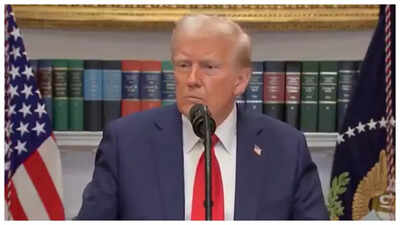ARTICLE AD BOX

Trump calls for Chinese and Indian graduates to stay in US and launch companies
President Donald Trump has taken an unexpectedly supportive stance toward international students, particularly from China and India, marking a shift from earlier hardline immigration policies.
In a recent press briefing, Trump strongly advocated for allowing foreign graduates to remain in the US and contribute to its economy by launching businesses and working in major American companies.Trump stated that international students, especially those who complete four-year degrees in US institutions, should not be forced to leave the country. He emphasized that highly skilled students from China and India often return home to start successful companies, which could have been established in the US had the students been permitted to stay.A shift from earlier visa clampdownsThis latest development signals a surprising reversal from prior policies targeting Chinese students. In the past, the Trump administration had called for stricter visa vetting and even paused new student visa appointments globally, including in China. Additionally, Secretary of State Marco Rubio proposed revoking visas for students allegedly linked to the Chinese Communist Party or those studying critical technologies.
Despite these initiatives, Trump now appears to favor retaining foreign talent.During his press briefing, Trump said, “I’ve always been in favor of students coming in from other countries. That includes China.” While he acknowledged the need for security vetting, he added, “You have to watch students, but you have to watch other people also.”Foreign students seen as economic contributorsTrump made it clear that allowing foreign graduates to stay and work aligns with US economic interests.
He cited examples where companies like Apple were unable to hire top graduates due to visa limitations. “If you get educated for four years, you’re willing to get educated for four years... I’m also in favor of having them stay,” he said, suggesting that a US education should be a path to permanent contribution.As reported by the South China Morning Post (SCMP), Trump pointed out that denying these students the opportunity to stay results in them building successful companies elsewhere.
He said this pattern must change, adding, “I think we’ll probably end up doing something about that.”China and India lead in international student enrollmentAccording to the US State Department, a total of 1.1 million foreign students were enrolled in US universities during the 2023–2024 academic year. Among them, India was the top contributor with 331,602 students, reflecting a 23 percent increase from the previous year.
China followed with 277,398 students, marking a 4 percent decline. These two countries continue to represent the largest segments of the international student population in the US.While India has overtaken China as the top source of international students, Chinese nationals have historically dominated the numbers since 2009–2010. However, Chinese student enrollment has steadily declined since 2019–2020.Congress remains cautious despite White House shiftDespite Trump’s supportive comments, skepticism lingers in Congress. As reported by the SCMP, lawmakers continue to express concern over China’s technological ambitions. Representative Bill Huizenga warned that Beijing is exploiting relationships with US universities to gain a technological edge. During a congressional hearing, he accused China of using “state subsidies, forced tech transfers, economic espionage, chip smuggling,” and other means to dominate critical technologies.Officials from the Bureau of Industry and Security echoed these concerns, requesting a 133% increase in enforcement funding to prevent export control violations. As quoted by the SCMP, Undersecretary Jeffrey Kessler said, “We could do a lot more with the additional resources... I’m concerned that many instances of wrongdoing go undetected.”Trump links student visas to trade diplomacyTrump has also tied the issue of student visas to broader trade negotiations with China. As reported by the SCMP, he said a trade deal was pending approval from President Xi Jinping and suggested that the agreement could include provisions supporting Chinese students in US institutions.
While policy details remain unclear, Trump’s remarks have introduced a new tone—one that positions international students not as risks, but as valuable contributors to America’s innovation and economy.



.png)
.png)
.png)
















 3 hours ago
4
3 hours ago
4









 English (US) ·
English (US) ·